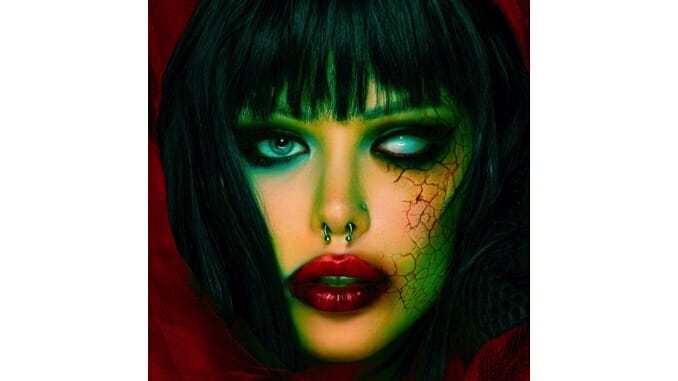Alice Glass Works Through Her Trauma Objectively on PREY//IV
On her long-gestating debut album, Glass sounds like she’s walking through memories of being emotionally abused, rather than raging with daggers out
Music Reviews Alice Glass
For Alice Glass, escaping her longtime emotional abuser hasn’t meant winning some sort of battle, or erasing the abuse from memory. Through her music, the 33-year-old Los Angeles-via-Toronto electronic musician born Margaret Osborn conveys that life after abuse is more like a new existence where the scars linger in the background and everything feels kinda okay—maybe never great, just okay. “I’m getting used to it, pain is temporary / There won’t ever be room for happy memories,” she sings through sheets of vocal manipulation on “Baby Teeth,” a ravey highlight of her debut album PREY//IV. “It isn’t fair / And it will never be,” she continues, exuding neither venom nor jubilance. Her words just sound like facts: On PREY//IV, she mostly processes her trauma by restating, without much embellishment, what she’s been through. She gradually approaches an imperfect sort of acceptance through her frequent but not quite unwavering neutrality, and her harsh blasts of noise and percussion—with vocal effects that distort her voice into disembodied coos and urgent shouts—act as reminders that not every reckoning leads to liberation.
Longtime Glass fans might observe parallels between PREY//IV’s sound and the music of the band in which she was emotionally abused. In continuing to explore that group’s abrasive, icy sound, she reclaims the power that her abuser attempted to steal from her. And in collaborating with her partner Jupiter io, formerly of noise-pop band HEALTH, she brings her own softer, foggier edge to the blistering rave music with which she’s often associated. On “I Trusted You,” she sings of the faith she once had in her abuser becoming as distant as dreams. Cloudy, pillowy synths and percussive flutter surround her, enveloping her in a foggy blanket that at once recalls the lighter side of her old band and gestures toward the introspection she could never achieve there. Her voice glides through the arrangement like a slow wind swirling around mountains, a pace at which she can stay even-keeled as she reckons with all the fallout.
When she more explicitly addresses the abuse she’s faced, she delivers her lyrics almost conversationally (though still with plenty of Auto-Tune), like they’re just thoughts rolling off her tongue. She recites her abuser’s words with minimal affection and, in the process, robs them of power. “Don’t talk to your friends / Don’t talk to your family / Don’t tell anyone / You’re not worth believing,” she sings breathily, over an arrhythmic beat, on “Pinned Beneath Limbs.” Her ballistic percussion highlights the constant fight-or-flight state of being abused and the disorientation of being so unvalued by someone who should’ve supported you. Highlight “Fair Game” is a bleak, thrashing laundry list of awful things her abuser would regularly tell her: “When you dance you look like a clown,” “You screw up everything,” “I’m so embarrassed for us.” All these lyrics arrive in a cold, unfeeling tone that sharply contrasts Glass’ shouts of “Where would you be without me?” during the chorus. She alternates her screams with a plainspoken version of the same lyrics, as though by yelling them, she can bend and twist them until their sheer falsehood and ridiculousness become undeniable.
Similar shouts dominate “Love Is Violence,” a stuttering, crushing examination of how abusers meet their victims’ care for them with sheer manipulation. After Glass yelps the title in the chorus, she sings about a love that drains all her blood atop oppressive blasts of electronics, the musical brutality emphasizing the emotional wounds. She revisits her abuse without detailing any specifics, and this ambiguity is occasionally her downfall: On “Everybody Else,” there’s an uneven balance among the arms-length lyrics, the music box sample and the kick drums that swoop in from hell. The sound is eerie and childlike, too playful for its lyrics about disappearing into subservience.
On the opposite end emotionally is the album’s one revenge fantasy. “Watch the hunter be the hunted!” Glass shouts gleefully over a searing rave beat on “The Hunted.” It’s among the album’s most visceral moments, a jump-along-shout-along moment in the vein of her prior best works. Her temptation for reprisal is understandable, and she only gives into it on this one song: She knows violence often causes more problems than it solves, and after briefly entertaining the thought, she keeps on living her life.
Sometimes, Max Freedman sits and writes about music, and sometimes he just sits. Oh, and sometimes he critiques, too. Follow him on Twitter and find his writing at Pitchfork, The A.V. Club, MTV News, FLOOD, The Creative Independent and, of course, here at Paste.